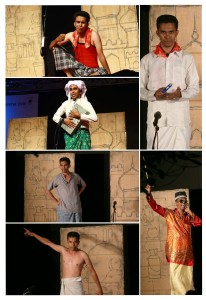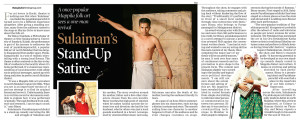
 For art lovers in Kochi, theatre is nothing new. But when ‘Sulaiman’ concluded his payakkamparachil it turned out to be a different experience altogether. After giving a standing ovation, many from the audience rushed to the stage at Marine Drive to know more about the folk art.
For art lovers in Kochi, theatre is nothing new. But when ‘Sulaiman’ concluded his payakkamparachil it turned out to be a different experience altogether. After giving a standing ovation, many from the audience rushed to the stage at Marine Drive to know more about the folk art.
For Binoy Nambala, a PhD scholar of theatre at Kaladi Sri Sankaracharya University, the performance is part of his journey to rediscover the soul of payakkamparachil, a popular folk art of north Malabar that has largely disappeared from public space. Payakkamparchil is a way of realistic storytelling with a strong local flavor. The theme is often centered on the day-to-day life of residents in the locality where it’s being performed. It’s a humorous representation of local characters with subtle socio-political messages, spiced up with slang and jokes in perfect north Malabar dialect.
“It was a Mappila folk art prevalent in north Malabar region till 1960s. What you see is an improvised version of it and my attempt is to find its original format and revive it. Unfortunately, there is no written record or documents available to explain how it was performed originally. Through feedback from the audience and research I am trying to crack it,” says Binoy.
Sulaimante Payakkamparachilukal is a standup comedy narrating the life and struggle of Sulaiman and his mother. The story revolves around his mother, father and a few other characters chosen from his own locality. Binoy touches the high point of emotion when he makes Ayisha narrate the intense love and devotion she had for her husband who, for others, was just a local goonda murdered in a brawl. Accompanied by emotion-filled music and song, Sulaiman narrates the death of his mother, leaving the audience literally in tears.
In the span of an hour, Binoy metamorphoses into six characters, each having a distinct costume and story. The smooth sailing from one character to another happens in front of the audience and he even changes costumes on stage. Throughout the show, he engages with the audience, taking comments and giving back without hindering the flow of the story. “Traditionally it’s performed in front of a small local audience through close interaction with the audience,” says Binoy, who belongs to Parappanangadi in Malappuram district.
An award-winning actor with 20 movies and more than 500 performances to his credit, for Binoy, payakkamparachil is a novel attempt to pursue a production-oriented PhD against the conventional written thesis. “I am bad at writing and wanted to use my acting skill as the main content of my thesis. Once completed the major part of my thesis will be my performances,” he says. It took over four years of continuous research and improvisation to give shape to the present form. The content and dialogues slightly varies according to the locality and topical socio-political developments. “I am still not sure about the actual format and setting of this art. My inquiries have revealed that it existed in varied formats from simple storytelling to informal interpersonal communication between two persons. Elders say it was used as a crowd pulling technique in Malabar to draw crowds to religious sermons during the month of Ramadan,” Binoy muses. First staged in 2016, Sulaimante Payakkamparachilukal has been staged in a dozen places across the state and abroad and it is adding more flavour after each performance.
“The once popular tradition of Payakkamparachil disappeared probably after the advent of radio and television as people got newer avenues for entertainment. SK Pottekkatt has mentioned the art his Oru deshathinte katha where artistes in traditional Muslim costumes come and perform in Hindu houses during Sivarathri festival,” explains Gopan Chidambaram, director of the show and Binoy’s research guide. “It has strong potential to be developed as our own standup comedy deeply rooted in Mappila dialect and culture. It keeps on evolving and getting enriched by each performance. Binoy is a promising talent and payakkamparachil will soon find a place in the repertoire of our folk culture”, Gopan says.
After travelling across the state, Sulaimante Payakkamparachil finally made its debut in north Malabar, where this art form originated, in Udinur in Kannur district on March 22, and Benoy expects a breakthrough in his search for the soul of this art.
Published in The Times of India, Kochi on 24/03/29018 https://epaper.timesgroup.com/Olive/ODN/TimesOfIndia/#
Tags: Binoy Nambala, Gopan Chidambaram, Kaladi Sri Sankaracharya University, Malabar, Mappila folk, payakkamparachil
https://epaper.timesgroup.com/Olive/ODN/TimesOfIndia/#
Sulaiman’s Stand-Up Satire